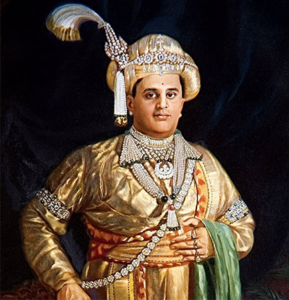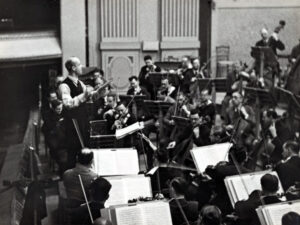News
We are constantly updating our list of concerts. And some of our members reply to the "wanted notices" we post in the news. This was the case for the concert with the Blüthner Orchester in 1915.
Why is this so? The work carried out over thirty years ago by René Trémine, supplemented by other discoveries — in particular the BPO's list of touring concerts — still constitutes a reliable and exhaustive base, the source of the list of our site.
But the availability of programmes on major orchestras' websites (Vienna Philharmonic and Symphony, New York, Frankfurt...) and above all the digitisation of newspapers from the period mean that it is possible to compare the programmes announced — and often included as such in the 'list' — with the reality of what was actually played, with changes, or even astonishing surprises, that we are eager to incorporate into the database.
Two examples, just for Mannheim, in February 1919:
– On the 8th: the list announced, with pianist Lili Koppel performing, Schumann's Concerto and Liszt's Fantaisie hongroise. In fact, the Orchestra and Furtwängler performed Hungaria, Liszt's symphonic poem, while Koppel, with the same orchestra, performed the Konzertstück opus 40 by Cécile Chaminade as well as Schumann!
– On the 18th: cellist Paul Grümmer was scheduled to perform Eugène d'Albert's Cello Concerto, a premiere in Mannheim. However, due to travel problems, he was replaced at the very last moment by soprano Elfriede Müller (from the Nationaltheater), who sang an aria from Gluck's Alceste. But surprise, surprise: Paul Grümmer had just arrived and, replacing the concerto, he performed Max Reger's Suite for Solo Cello, in A minor, Opus 131 No. 3, which had also been included in the programme.
It's always comforting to think that we still have something to grind.

We recently announced the release of our next product: Bruckner's 8th Symphony from 1954.
The audio quality of the recording is exceptional, comparable — to stick with the same period — to the Paris concert in May (Radio-télévision française) or Beethoven's 9th in Lucerne (Swiss Radio).
Why? The answer is one word: the C12.
What lies behind this acronym? Read more.

SWF D14 to be released: Bruckner's 8th from 1954
SWF is releasing a recording of Bruckner's Eighth Symphony, made during a concert in Vienna by the Wiener Philharmoniker on April 10, 1954.
Released on April 10, to mark the 70th anniversary of the concert
This performance has not been well received. When it was first published forty years ago, it even raised doubts: what if it were a fake? No, it is indeed a Furtwängler concert — and his last 8th — but the audio quality of this recording was so deplorable that it tended to be dismissed as a foul-smelling item.
But afterwards, the recording's fate changed, with some very good reissues, and one might wonder whether listeners were struck by deafness. This performance must be heard in the exceptional sound of the recording: phenomenal dynamic gradations ranging from the edges of silence (solos at the end of the Adagio) to the volcanic eruptions of the Finale; a very wide sound spectrum; and an infinite palette of colors... A forthcoming article will shed some much-needed technical light on this.
On closer listening, we discover a performance that matches the conductor's most recent interpretations of Beethoven, Schubert and others — typical of his latest style. Without the excesses of a Celibidache, Furtwängler deploys ample gestures, while remaining perfectly spirited, without the stress of the 1944 interpretation (due to the war). The pinnacle is undoubtedly the Adagio, a vision of another world... He has been criticized for using the "Haslinger" score, i.e. the first edition of 1892, and not the "Haas". Furtwängler was no great admirer of Haas, and it is unclear whether the Philharmonic had the appropriate material. However, as in 1944, Furtwängler made his own slight amendments to the score. Christophe Hénault has devoted all his care to bringing this product to life, notably by removing wowing, tape skips and noises that interfered with the musical content, but without affecting the exceptional sound quality, as exemplified here (Beginning of 2nd movement. Warning: mp3).
This concert will be available for streaming (HD and SD), but we highly recommend downloading it. The digital pack (€10 ) will include:
– a comprehensive booklet with a text by Mark Kluge,
– with inside: a number of previously unpublished snapshots (rehearsals and concerts), such as the one below,
– a technical paper about recording,
– a facsimile of the programme,
– a podcast interview with Bruckner specialist Jean-Claude Hulot (Diapason, Res Musica…).
Wikipedia, the high priest of supposedly reliable information, states in its French article about the 8th Symphony, with reference to this recording: « The 1954 [version] is to be avoided: the interpretation lacks tension and the acoustics are poor... » Let the writer of this laconic judgment listen to the SWF publication!
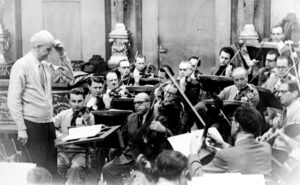
Rehearsal, April 9, 1954
Here is — click here — a facsimile of the programme of October 13, 14 and 15, 1940 at the Berlin Philharmonic.
It features an — exceptional if somewhat forgotten these days — pianist, Eduard Erdmann, already mentioned on this website.
Along with Furtwängler, he performed Chopin's 2nd Concerto, as part of concert devoted entirely to Romantic music: Weber's Oberon, Tchaikovsky's Pathétique, and… Pfitzner's Opus 46.
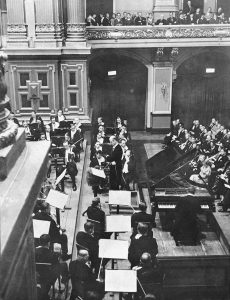
In the news article of February 22, we raised an enigma: did Furtwängler perform in Berlin as early as 1915, long before he performed with the Philharmonic?
Investigations brought results: yes, Furtwängler did conduct the Blüthner Orchester in 1915. It was on March 19, in the Blüthnersaal photo below, for a charity concert to support survivors of the Navy.
Performing with him were Joachim's pupil, violinist Waldemar Meyer (1853-1940), Austrian soprano Hedwig Francillo-Kauffmann (1879-1948) and baritone Sydney Biden (1873-1957).
The programme (compiled from articles):
– Gluck: Overture for Alceste,
– Beethoven: Leonore III Overture
– Strauss: Tod und Verklärung
– Mendelssohn: Concerto for violin (W. Meyer)
– with Hedwig Francillo-Kauffmann:
- Haendel: Aria with flute, from L'Allegro, il Pensieroso ed il Moderato,
- Verdi: Aria from Traviata and/or Meyerbeer: "Ombre légère" from Dinorah
– with Sydney Binen: Beethoven: "An die Hoffnung" (orch. Mottl)
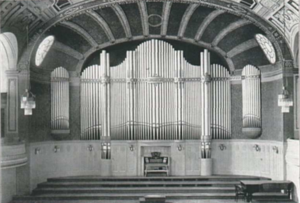
Selling off the stock of CDs and closing the box
You may have noticed some changes and new features here: a new look for the site, the introduction of streaming and the launch of the YouTube channel.
Now we're making another major change: as the title says, we've decided to sell off our stock of compact discs and close the storage space (a car park box).
Of course, it is your right to know the reasons for this.
Sales of our CDs have fallen off sharply over the last 2 or 3 years. At present, they barely cover a third of the annual cost of our box (rent and insurance), so we're losing several hundred euros a year — money we could use better elsewhere.
On the other hand, since 2017 we have stopped publishing physical media and moved towards downloading, supplemented by streaming. The references currently on CD will not disappear: they will gradually be streamed. In a way, this change is a logical follow-up to those made since the last General Meeting, during which we promised you a renewed and modernised SWF.
To clear our stock, which still contains more than 4,000 items, we are offering a final sale consisting of a pack (SWF 2024) containing one copy of each available reference of the French society's CDs, referenced SWF xxx. — View the catalogue
To order : SWF 2024
The price is €30
Shipping costs of €10 (France/EU/Switzerland/Monaco) or €20 (rest of the world) will be charged in addition.
This special promotion runs from March 1 to March 22. Orders will be dispatched between 23 March and 10 April.

Among the many autograph letters by Furtwängler available on online sales sites, there's one that strikes a nerve among us Furtwänglerologists. It is dated March 29, 1915, and addressed to the director of the Blüthner Orchester, from Lübeck, where Furtwängler was the conductor of the Verein for a few more weeks.
This very independent ensemble from Berlin, founded in 1907 and merged with the Berlin Symphony in 1925, had a very adventurous programming strategy involving young conductors and soloists. Eugène Ormandy performed there at the age of 18, and Edgar Varèse premiered one of his first works.
In the letter, Furtwängler mentions the invoice he received from the Orchestra (which he no longer finds) for the hiring of extra musicians, and ends the message with the request to kindly express to the musicians his gratitude and satisfaction for the concert...
Which concert? The lists documenting the conductor's activity from 1906 to 1954 place Furtwängler's first appearance in Berlin on December 14, 1917, conducting the Philharmonic. However, the terms of this letter are explicit: he conducted a concert in March, or even February, more than two years earlier, leading the Blüthner Orchester.
Can anyone give us some information?
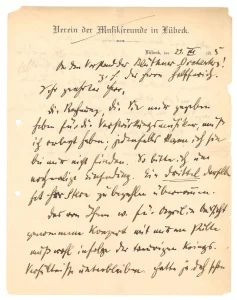
We were about to pusblish a wanted notice...
We found the following poster on the Internet, which caught our attention and made our thoughts wander. This was in London, in the 1924-1925 season of the London Symphony. It informs us that tomorrow — yes, tomorrow, but what date? — Furtwängler will conduct a fine program including Lalo's Cello Concerto, performed by the great Pablo Casals.
But this concert was not on any list. Not even in John Hunt's Furtwängler and Great Britain. So what happened? Was the concert cancelled?
Fortunately, the LSO archives are well kept — thanks to Libby Rice — and we now know that this concert did indeed take place, on November 24, 1924, four days after another with the Royal Philharmonic.
Our database has been updated.
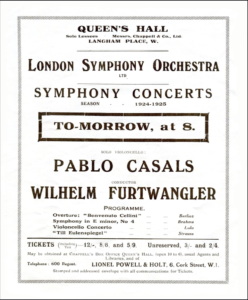
When Furtwängler arrived in Leipzig at the end of January 1922 for a concert scheduled for the 26th, the news was already in: Arthur Nikisch had died the day before. The concert therefore shifted to a commemorative tribute, and the programme changed: Coriolan, Brahms' Vier ernste Gesänge with Sigrid Onegin, and the Eroica.
Nevertheless, some (notably the family) thought the complete performance of Beethoven's 3rd Symphony was unwelcome, while only the slow movement — the Marcia funebra — or even the 1st movement, seemed appropriate.
The programme, already printed, was once again modified, leaving only the Funeral March from the Eroica, with Michael Raucheisen replacing Günther Ramin to perform with Sigrid Onegin.
Here are the two front pages of the programmes. Before and after.

The Streaming collection is today expanded to include works from the 20th century, including Furtwängler's 1967 "re-premiered" Te Deum.
Paul HINDEMITH: Symphonic Metamorphosis. BPO 1947
Karl HÖLLER: Cello Concerto No. 2. Ludwig Höllscher / BPO 1949
Arthur HONEGGER: Symphonic movement n° 3. BPO 1952
The work is dedicated to Furtwängler and the BPO.
Maurice RAVEL: Rapsodie espagnole. VPO 1951
Richard STRAUSS: Metamorphosis, for strings. BPO 1947
Wilhelm FURTWÄNGLER: Te Deum
Edith Mathis, Sieglinde Wagner, Georg Jelden, William Dooley
Philharmonischer Chor Berlin / BPO / Hans Chemin-Petit (Berlin 1967)
Stay tuned for new additions.
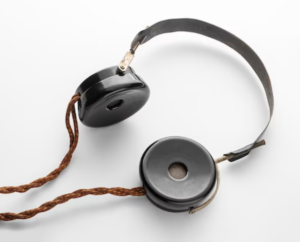
A quick glance at the cover of this programme reveals only "Concertgebouw" in large letters printed across the top. A closer look reveals that this is not one of Furtwängler's rare concerts with this orchestra, but a performance on tour by the Berlin Philharmonic. And looking even more closely, this is no longer Amsterdam, but The Hague...
There's nothing unusual about this all-Beethoven line-up.
But this evening of February 8, 1932, and others around it, deserve our attention for a very special reason. Furtwängler and his orchestra are accompanied by an unusual guest, photographer Erich Salomon — who disappeared in 1944 in the Theresin camp — the man who was once called "the King of the Indiscreet", so successful was he in capturing politicians and artists at a glance with his little Leica.
He was close enough to Furtwängler for the latter to allow him to take snapshots during his breakfast in Potsdam! In any case, the result is a unique and remarkable report on Furtwängler and his 1932 tour, and in particular on his stopover in The Hague: an impressive number of shots, of which here is an example, taken during the "Sitzprobe".
It's been many years since we heard the precarious recording of Richard Strauss's Vier letzte Lieder, made at their premiere — or dress rehearsal? — on May 22, 1950 in London. Kirsten Flagstad was the performer — chosen by Strauss himself — accompanied by the Philharmonia conducted by Furtwängler.
Comments on the origins of the recording abounded, most of them attributing the initiative to Walter Legge, head of the Philharmonia, rather than to the BBC.
A press article, which has gone completely unnoticed, shed some light on the subject. It appeared in La Presse, a Parisian newspaper launched in 1836, which ceased to be a daily and then barely a weekly, disappearing altogether in 1952. The unsigned article appeared in the June 11, 1950 issue, with the headline "Un maharadjah ressuscite la musique de Strauss" ["A maharajah brings Strauss's music back to life"].
It explains how the maharajah of Mysore (Jaya Chamarajendra Wodeyar Bahadur), a patron of the orchestra, had made the concert possible by guaranteeing the income, in order to allow the posthumous premiere of the composer's last song, which had died eight months before; and concludes :
« The singer's triumph would have been complete, had the man who made it possible been present. But the maharajah, detained in his homeland by his duties as sovereign, was not in London.
It won't be long, however, before he gets to know the last four lieder on which he has spent so much money: Kirsten Flagstad's voice has been engraved in wax, and the discs have been flown the day after the concert to Mysore, where the maharajah is waiting to grant them a place of honor in his record library, which numbers no less than twenty thousand recordings. »
(Source Gallica/BnF)
